Shroud of the Avatar E3 interview: Lord British speaks to his people
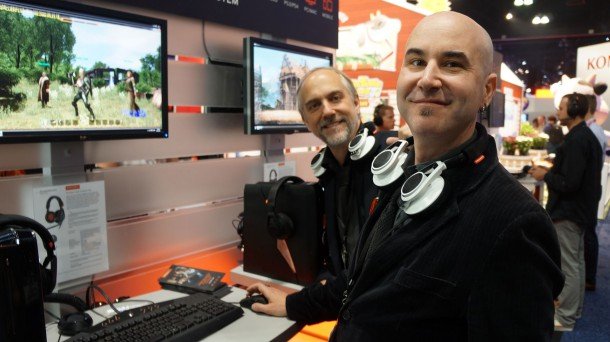
E3 2014 is the first time that many in the press have been able to see Shroud of the Avatar , the new crowdfunded role-playing game from Ultima creator Richard Garriott. But that doesn't mean its backers are in the dark. Garriott, aka Lord British , says the people who have backed his game are included in every step of the process—some have even created art or music that will be used in the game.
PC Gamer spoke with Garriott and executive producer Starr Long on the E3 floor about the game, and how transparency—and the Unity engine—has changed the game development process for the better.
PC Gamer : What was it like to start making this game as a crowdfunded thing. Was that completely different than anything you've done before?
Richard Garriott : It's completely different. I think what's more interesting, or at least as interesting, is the learning curve of, first of all, making the decision to go this way, when frankly our default assumption would have been to do it the old way. But we've done that already twice before. We built Origin, sold it to EA, and frankly had to leave. Then we built Destination Games, sold it to NC Soft, eventually had to leave. I thought, “Do we really want to do that again?” because we kind of knew what that cycle's endgame was going tgo be like. It starts nice, but becomes harder and harder.
And so we thought, “Maybe we'll try this new way.” However, if you decide to go down the crowdfunding way and it doesn't work, it really means you're game over, in the sense that, if we said we wanted to do the spiritual successor to Ultima and the crowdfunding failed, we would never be able to go do the spiritual successor to Ultima with a bigger company. Because they'd look at that and go, “Well it didn't work there. Why would we pick it up?” So it was a huge faith bet for us. Frankly, it was a scary faith bet for us to try this other way, because we didn't know how it would play out. Because it's actually pretty hard to go and be a multi-million dollar crowdfunded campaign.
But once we started it, it's been interesting to see how, not only did it work really well to begin with, but opportunities have continued to show up that we never predicted would be there. So for example, we're not only crowd funded, which was the whole intention, but we're crowd sourced, in many ways that we never anticipated. We knew we'd be able to get some artists in our community that might produce some art for our game. That was expected. But as a case study, we looked at music. And I'm very particular on music. if fact, as I look back at Ultimas historically, there's a guy named Ken Arnold that did a lot of the Ultima music when it was back in three voices on a mocking board, that I really liked. And I still remember it, and I love those pieces. Whereas, frankly a lot of the later stuff, a lot of music in games that's very orchestral and they have these giant pieces—that's just not the music I want in this game.
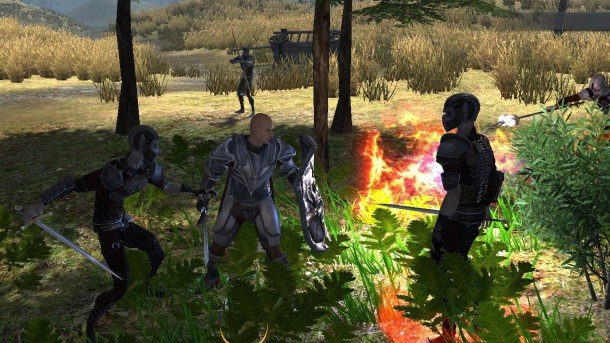
And so the community was quick to go, "Well, I'm a composer, I'll make you some music!” But you listen to the stuff they put up on SoundCloud and go, “Yeah, well, you're no Ken Arnold. Thank you very much for your interest, but here's what's not right about it in composition or orchestration, or instrumentation.” And finally as the community began to self-organize around these various disciplines, they came up and said, “Richard, give us clear communication as to what you're looking for.” And that's fair.
Keep up to date with the most important stories and the best deals, as picked by the PC Gamer team.
So we had a Google Hangout and wrote up a handful of docs, and I said, "Here are these pieces that I really liked and here's why, and here's some pieces even in Ultima that I'm less happy with, and here are some pieces we could buy on the Internet from royalty free sources, but that's really not the right way to go—and why. So if you can beat these goals, then more power to you."
And they went out, they did their own Kickstarters to bring on equipment and technology, both hardware and software, in order to as a group be able to produce at the highest possible quality technically, and then they self-policed and made it amongst themselves how to meet those goals. And after maybe a month or two months, ever since then, every piece of music the Bard's Guild has submitted for use in the game as been perfect. Not just acceptable—better than I could possibly imagine. So they went from batting zero to batting 1000—just by clearer communication between us and the community.
PCG : How many people is that in the Bard's Guild?
Garriott : Well at first it was maybe half a dozen. But now it has continued to grow, and there's now dozens in there. And they don't all end up getting music that comes to our desk, but that's what the guild does. They encourage people to participate, they police amongst themselves, they know what the quality bar is, they know we only need 50ish pieces, so they know they don't want to promote one until it's ready. And so it just operates on its own now.
And there's another group, called the College of Arms, that's a group that's really into heraldry. And one of our pledge tiers allows you have your coat of arms in the game where it can show up on cloaks and shields for you. Well we did that in our Kickstarter without really having a plan for how we'd get everyone's unique coat of arms into the game. And the College of Arms looked at that and said, “You guys are really in trouble,” because if you hold that many bitmaps, we know enough about coding to know you're going to completely blow your budget. Another way to do that is to do this with—they not only started to design it, but they started thinking of tools necessary to record each individual's unique arms in a way that can be built out of stacks of bitmaps, in a way that is both proper heraldry to the degree we want it to be proper, but also is efficient technically, and can be exported directly into the game. And they wrote all the code.
So not only are they doing the community work, but all of the coding work, and all of the aesthetic work. And they check in with us all the time. We never would have even conceived it being this well, much less being implemented this well. And these types of stories are happening all the time with our community development.
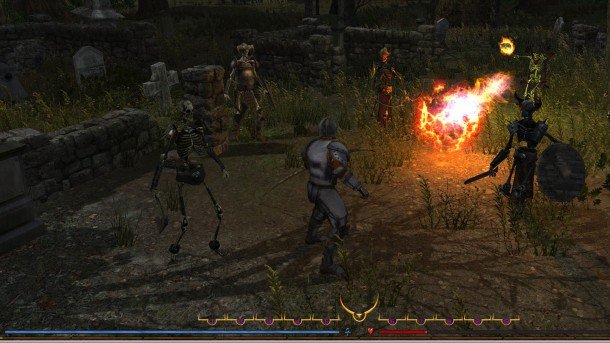
PCG : Has that kind of community contribution really changed the scope of the game compared to what you had planned?
Garriott : Absolutely. And it changes the way we even think about the game.
Starr Long : We like to talk about developing in the open. Where every single day, each group gets together and has a stand-up meeting. We post those notes to our forums, so the backers know every single day what every single person on the team is working on -- so they know where their dollars are going. We put out weekly updates, giving status on the game. WE give quarterly updates what the schedule's going to be, and we always meet those dates. We tell players what's going to be in here, but more importantly, we tell them what's not going to be in here. Because one of the effects of this new model is that players are getting exposed to content way earlier than they've ever been able to see. They're playing a pre-alpha of a game, and no developer in their right mind would let players into a pre-alpha.
Garriott : What's interesting too is that the people who have been there since the beginning, and only saw an avatar on a map—they understood it's just an avatar on a map. And the next month, when it was an avatar on a map and a pet, you know, they're going, Woo! it's better! The people who weren't with us from the beginning just say, “This game's not finished.” Because they're used to the old way. But once they've been with us for a month, they go, “Okay, I get it. I'm in the rhythm with you, seeing this whole thing unfold in real time.” And getting a chance to contribute, design wise, all the way through. And some of our backers are going, “I don't want to spoil it and don't want to play it until it's finished enough to enjoy as a real game.” And others are enjoying getting a chance to impact the game.
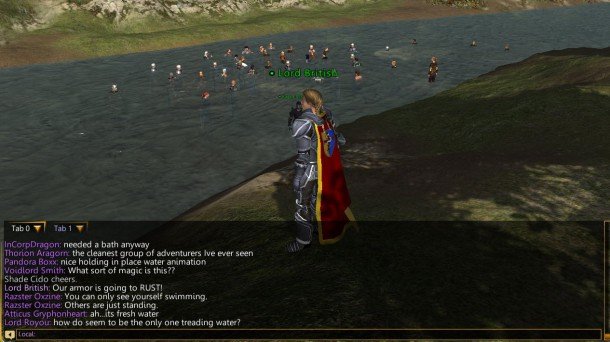
PCG : What's day-to-day like for you guys working on the game?
Garriott : Two things have made this development cycle really special. One is the crowdfunding, which is what we've been talking about. The other is Unity. I feel a huge debt to Unity. I think we're finally to the era as a game industry where we don't have to rebuild the camera from scratch every game. And there were render pipelines that have been very good, like Unreal or Crytek, but the thing to my mind about Unity is, all of the developer tools, which are incredibly well integrated and the UI is completely standardized, and the asset stores and the community that's built around it. Unity is phenomenal. It literally is a game changer, not just for us, but it's a harbinger for what's to come in the industry.
What those two things have allowed us to do is, while most MMOs would take four years and $40 million minimum, we're going to be able to do this in two years, head to tail. Because we're not building the engine from scratch. Not only that, but because of all of the asset stores and community pieces that we've been able to glom in, we've been able to reduce our team size down to 30. So for a quarter of the cost, we are able to produce at a level that would have taken us much more trouble or time or money in any previous iteration. And the value of being at a small 30 person team is that everyone knows what's happening. No one's just hanging out. And it means the people like us that have been in the management business for the past 20 years, meaning we do no game design and no work in the trenches, both of us are now back in the trenches completely.
Ultima 7 was the last Ultima that I designed the story and every character and pretty much every word they said. But I did that in concert with Warren Spector, who was kind of my partner in the writing of that game. Now with Tracy Hickman in this case, equally well qualified writer, I've re-drafted the story three full times, written out every NPC and every line of dialogue, up until it goes to the real writer, who will wordsmith it. But I know the story intimately, and I'm very happy with the story personally, because I wrote the damn story. Which in those bigger teams was just not possible.
So for people who liked Ultima 4 - 7, in particular, or Ultima Online, we're doing that work again ourselves. It will very much be like what people hopefully remember fondly. Because it's being done the way it was done in those days.
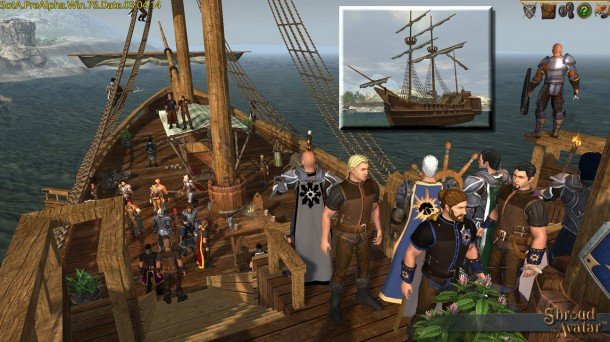
Long : Instead of doing a PowerPoint deck, I got to do the skill tree design.
PCG : What's the best encounter you guys have had with the community in-game? Whether it was funny or you ran into somebody doing something you wouldn't have expected them to do in the game.
Long : My favorite moment is—we have two personas in the game. Richard is obviously Lord British, and my character, Darkstarr—since Blackthrone is part of Ultima, I can't be Blackthorne anymore, so I'm Darkstarr. But chaos is kind of my bag, while he's all about virtue. So we have a sort of light and dark thing.
One of our community members is a devotee of Chaos. And she built a church of Chaos, a temple of Chaos, in a player town in the last release. And Richard and I were taking a tour of this town, and they surprised me with this temple of Chaos, and so I got up to the pulpit and started preaching about Chaos and had this philosophical debate with Lord British, and it was just awesome.

Wes has been covering games and hardware for more than 10 years, first at tech sites like The Wirecutter and Tested before joining the PC Gamer team in 2014. Wes plays a little bit of everything, but he'll always jump at the chance to cover emulation and Japanese games.
When he's not obsessively optimizing and re-optimizing a tangle of conveyor belts in Satisfactory (it's really becoming a problem), he's probably playing a 20-year-old Final Fantasy or some opaque ASCII roguelike. With a focus on writing and editing features, he seeks out personal stories and in-depth histories from the corners of PC gaming and its niche communities. 50% pizza by volume (deep dish, to be specific).

